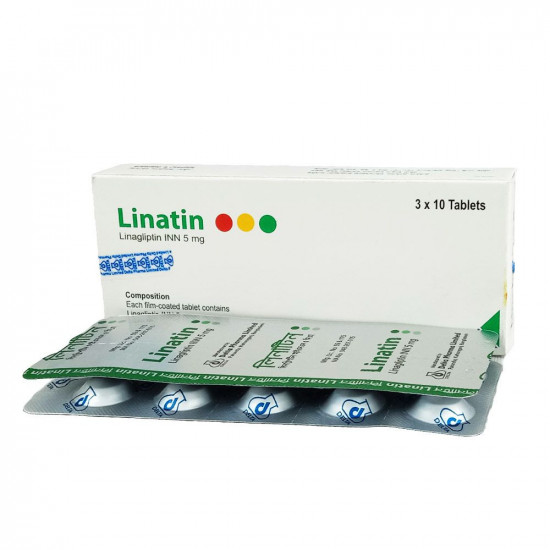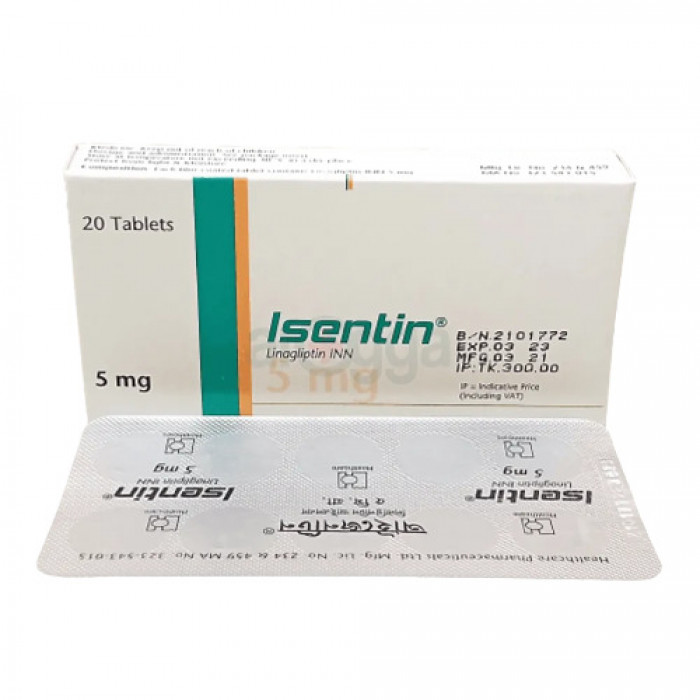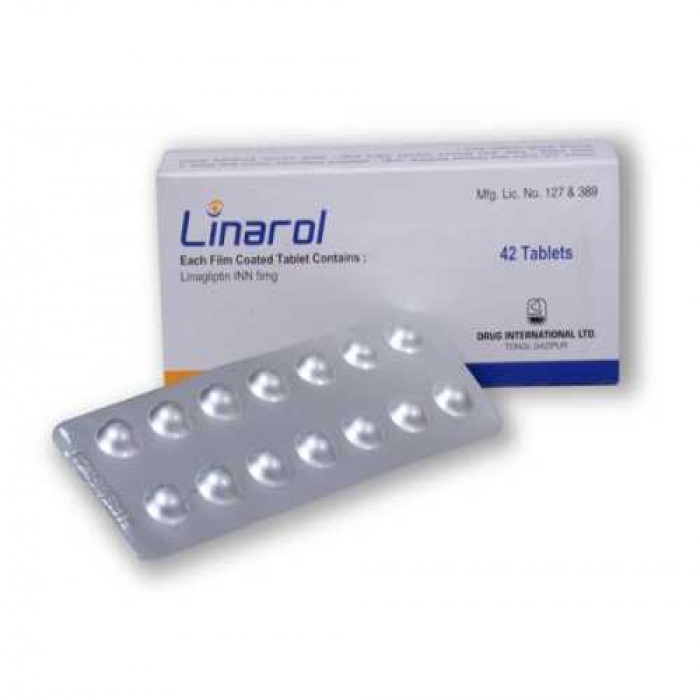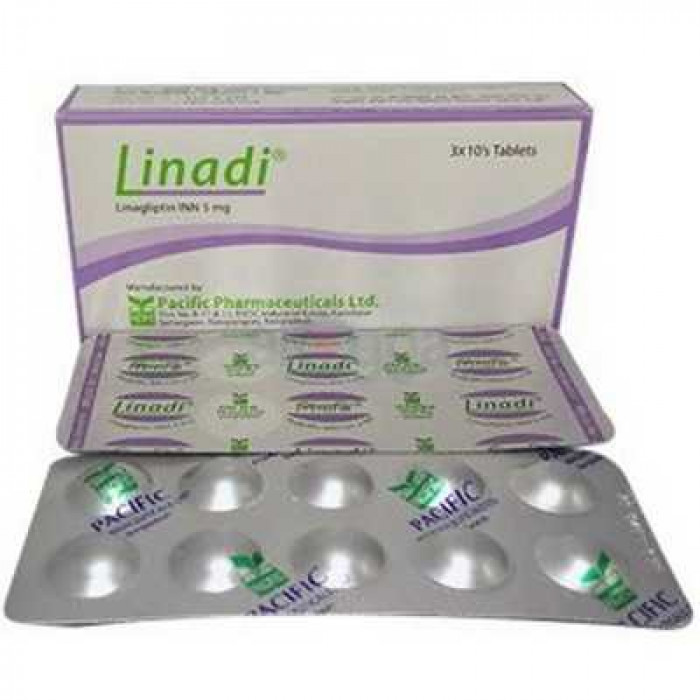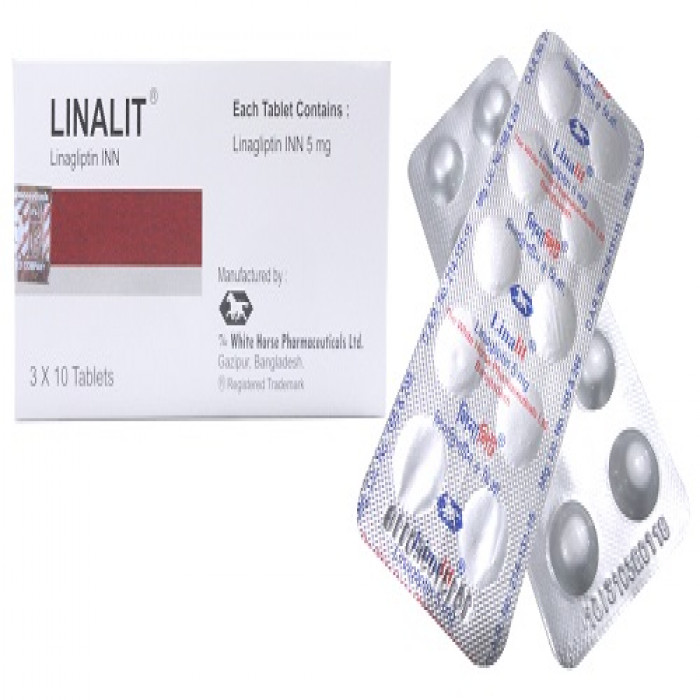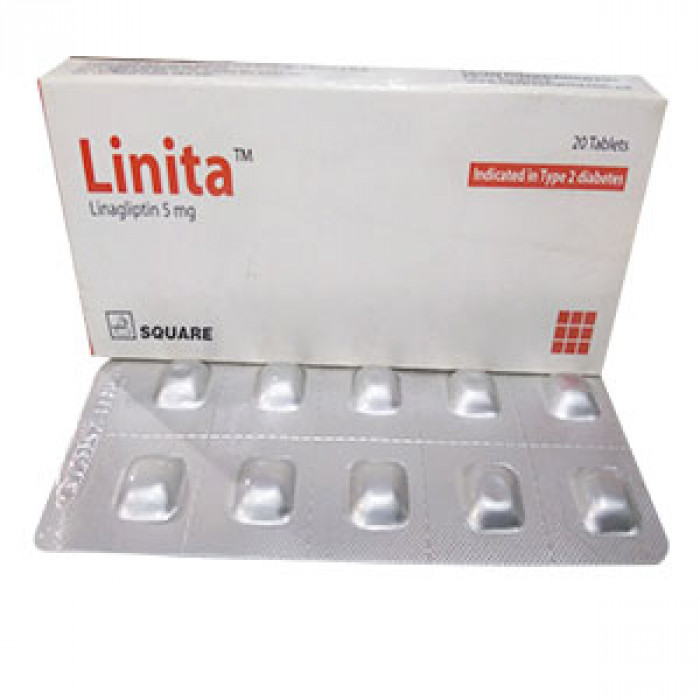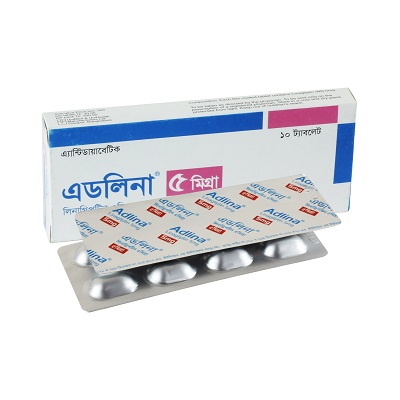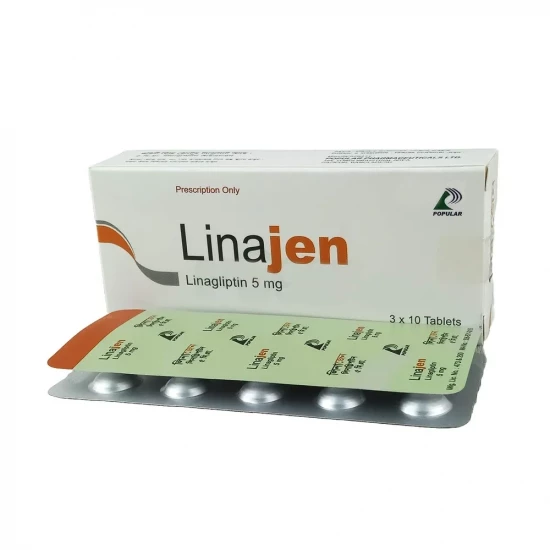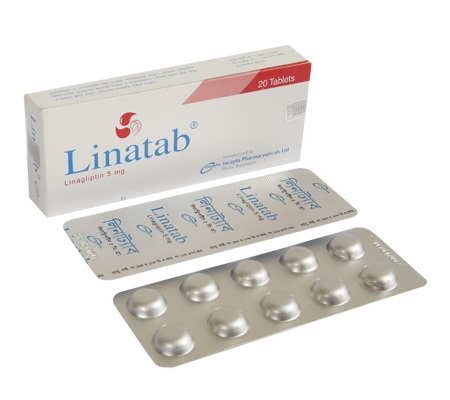
✔ 100% Authentic Product
👁️ Currently Viewing 3484
Linatab 5mg Tablet 10pcs
- Linagliptin is used to enhance Glycemic Control in individuals with Type-2 Diabetes Mellitus.
- Linagliptin may be used as monotherapy or in combination with other common antidiabetic medications including Metformin, Sulfonylurea, Pioglitazone, or Insulin.
- As a replacement therapy it is suitable when Metformin therapy is not appropriate due to intolerance or does not provide adequate glycemic control as monotherapy or other antidiabetic drugs are to be discontinued due to renal or hepatic impairment.
Discount
Price: ৳ 190
MRP:
৳
200
5%
Off

100% Genuine Products, Guaranteed

Safe & Secure Payments, Always

Fast, Secure & Efficient Delivery

Proper Packaging
 Cash on Delivery - All over Bangladesh
Cash on Delivery - All over Bangladesh Regular Delivery - 12-24 Hours, Dhaka City* Charge Tk.39-59
Regular Delivery - 12-24 Hours, Dhaka City* Charge Tk.39-59 Regular Delivery - 24-48 Hours, Other Cities* Charge Tk.99-110
Regular Delivery - 24-48 Hours, Other Cities* Charge Tk.99-110
🌙 রমযান অফার 🌙
 ফ্রি ডেলিভারিঃ - ৭৯৯ টাকা+ অর্ডারে, ঢাকা
শহরে
ফ্রি ডেলিভারিঃ - ৭৯৯ টাকা+ অর্ডারে, ঢাকা
শহরে ফ্রি ডেলিভারিঃ - ২৭৯৯ টাকা+ অর্ডারে, ঢাকার
বাহিরে
ফ্রি ডেলিভারিঃ - ২৭৯৯ টাকা+ অর্ডারে, ঢাকার
বাহিরে
📲 মোবাইল অ্যাপ অর্ডারে সাশ্রয় বেশী
-
Google Play Store থেকে ডাউনলোড
-
Apple Store থেকে ডাউনলোড
100% Genuine Products, Guaranteed
Safe & Secure Payments, Always
Fast, Secure & Efficient Delivery
Proper Packaging
 Cash on Delivery - All over Bangladesh
Cash on Delivery - All over Bangladesh Regular Delivery - 12-24 Hours, Dhaka City* Charge Tk.39-59
Regular Delivery - 12-24 Hours, Dhaka City* Charge Tk.39-59 Regular Delivery - 24-48 Hours, Other Cities* Charge Tk.99-110
Regular Delivery - 24-48 Hours, Other Cities* Charge Tk.99-110 ফ্রি ডেলিভারিঃ - ৭৯৯ টাকা+ অর্ডারে, ঢাকা
শহরে
ফ্রি ডেলিভারিঃ - ৭৯৯ টাকা+ অর্ডারে, ঢাকা
শহরে ফ্রি ডেলিভারিঃ - ২৭৯৯ টাকা+ অর্ডারে, ঢাকার
বাহিরে
ফ্রি ডেলিভারিঃ - ২৭৯৯ টাকা+ অর্ডারে, ঢাকার
বাহিরে- Google Play Store থেকে ডাউনলোড
- Apple Store থেকে ডাউনলোড
🌙 রমযান অফার 🌙
📲 মোবাইল অ্যাপ অর্ডারে সাশ্রয় বেশী
✅ Description:
- Linatab 5mg Tablet contains Linagliptin and belongs to the group of oral anti-diabetic medicines. It is prescribed to treat type 2 diabetes in adults when the disease cannot be adequately controlled with one oral anti-diabetic medication or through diet and exercise alone.
- This medication may be used in combination with other anti-diabetic drugs like metformin, sulphonylureas (such as glimepiride or glipizide), empagliflozin, or insulin. It is important to follow a regular exercise routine and a prescribed diet plan to achieve better control of glucose levels while taking Linatab 5mg Tablet
- Type 2 diabetes is a chronic condition where the body does not produce enough insulin or the produced insulin does not work effectively. This leads to elevated blood glucose levels, which can result in serious health problems like heart disease, kidney disease, and vision impairment. Symptoms of type 2 diabetes include increased urination, excessive thirst, hunger, fatigue, and blurred vision.
- Before starting treatment with Linatab 5mg Tablet, inform your doctor about any pancreatic, heart, or kidney problems you may have, as well as a history of gallstones, alcoholism, or type 1 diabetes.
- The use of Linatab 5mg Tablet is generally not recommended during pregnancy, as its effects on the unborn child are unknown. It is also unclear whether the medication passes into breast milk, so it is important to consult your doctor if you are pregnant or breastfeeding.
- Linatab 5mg Tablet is not recommended for use in children and adolescents under 18 years of age. The most common side effects associated with this medication include nasal congestion, runny nose, sore throat, cough, and diarrhea. If any of these symptoms worsen, it is advisable to consult your doctor.
Safety Advices

Alcohol
CAUTION
Linatab 5mg Tablet should be used with caution in patients with a history of alcoholism. Consult your doctor before taking it.

Pregnancy
CONSULT YOUR DOCTOR
Linatab 5mg Tablet is generally not recommended for use in pregnant women as it is unknown if it is harmful to the unborn child. Consult your doctor before taking it.

Breastfeeding
CONSULT YOUR DOCTOR
It is not known if Linatab 5mg Tablet passes through breast milk. Consult your doctor before taking it.

Driving
CAUTION
Linatab 5mg Tablet does not usually affect your ability to drive.

Kidney
CONSULT YOUR DOCTOR
If u have or had a history or evidence of any kidney-related diseases, please consult the doctor before taking medicine.

Liver
CONSULT YOUR DOCTOR
If u have or had a history or evidence of any liver-related diseases, please consult the doctor before taking medicine.
✔️ Uses of Linatab 5mg Tablet
- Treats Type II Diabetes in Adults
✔️ How does Linatab 5mg Tablet work?
The mechanism of action of Linatab 5mg Tablet is to increase the body's production of insulin, which efficiently regulates blood sugar. Additionally, it lessens the quantity of a pancreatic hormone called glucagon (glucagon stimulates the liver to create more sugar), which lowers blood sugar levels.
✔️ Side Effects of Linatab 5mg Tablet
- Anxiety
- Blurred vision
- Confusion
- Fast heartbeat
- Headache
- Nausea
- Increased hunger
- Slurred speech
- Chills
- Unusual tiredness or weakness
- Dizziness
- Low blood sugar levels
✔️ Quick Suggestions:
- Maintain a balanced plate: Fill half of your plate with starchy vegetables, a quarter with proteins, and a quarter with whole grains.
- Eat at regular intervals: Avoid long gaps between meals or snacks.
- Monitor blood sugar levels: Regularly check your blood sugar levels, especially when experiencing fluctuations.
- Engage in physical activity: Aim for at least 150 minutes of moderate-intensity exercise or 75 minutes of high-intensity exercise each week.
- Gradual weight loss: If necessary, aim for a healthy body mass index (BMI) by losing weight gradually.
- Choose whole grains: Replace refined carbohydrates with whole-grain foods and increase your intake of fruits, vegetables, and fiber-rich foods.
- Reduce saturated fat: Limit the intake of saturated fats found in chips, pastries, and other similar foods. Opt for cooking oils containing omega-3 fatty acids such as palm oil, mustard oil, groundnut oil, rice bran oil, and safflower oil for frying.
- Manage stress: Stress can affect blood sugar levels, so adopt stress management techniques like mindfulness.
- Choose low-fat dairy: Opt for low-fat dairy products like yogurt, fat-free milk, and cheese.
- Control blood pressure: Keep your blood pressure as close to normal (140/90) as possible to reduce the risk of cardiovascular diseases associated with diabetes.
- Take Linatab 5 medication consistently: Take it at the same time every day to ensure you remember to take it.
- Watch for hypoglycemia: Linatab 5 may cause low blood sugar levels, especially when used with other antidiabetic medications or alcohol, or if you delay or miss a meal. Carry sugary foods or fruit juice with you in case of hypoglycemia symptoms like cold sweats, pale skin, tremors, and anxiety.
- Be cautious while driving or operating machinery: Understand how Linatab 5 affects you before engaging in activities that require alertness.
- Report any concerns to your doctor: Inform your doctor if you experience joint pains or develop symptoms such as stomach pain, nausea, or vomiting.
✔️ Indication of Linatab 5mg Tablet
Linagliptin is used to enhance glycemic control in individuals with type 2 diabetes mellitus.
✔️ Pharmacology
Linagliptin is a medication used to improve glycemic control in individuals with type 2 diabetes. It belongs to the class of drugs known as DPP-4 inhibitors, which work by inhibiting the enzyme dipeptidyl peptidase-4 (DPP-4). DPP-4 is responsible for breaking down incretin hormones such as GLP-1 (glucagon-like peptide-1) and GIP (glucose-dependent insulinotropic polypeptide).
By inhibiting DPP-4, linagliptin increases the levels of active incretin hormones in the blood. These hormones play a crucial role in regulating glucose homeostasis. They stimulate insulin production and release from pancreatic beta cells in response to elevated blood glucose levels. At the same time, they reduce the production of glucagon, a hormone that increases blood glucose levels, from pancreatic alpha cells.
In summary, linagliptin enhances glycemic control by increasing and prolonging the activity of incretin hormones that are usually inactivated by the DPP-4 enzyme. This leads to increased insulin secretion and decreased glucagon secretion, ultimately helping to regulate blood glucose levels in individuals with type 2 diabetes.
✔️ Dosage & Administrations of
For oral administration in adults with type 2 diabetes mellitus, the typical recommended dose of this medication is 5 mg once daily. It is prescribed to lower blood sugar levels and can be used alone or in combination with other common antidiabetic drugs such as metformin, sulfonylurea, pioglitazone, or insulin.
There is no need for dosage adjustment based on age for elderly individuals. Additionally, no dosage adjustment is required for individuals with hepatic or renal impairment.
It is important to note that the safety and efficacy of this medication have not been established for children, and no specific dose recommendations are available for pediatric use.
For individuals with renal impairment, including those with kidney-related issues, no dose adjustment is necessary.
It is crucial to follow the prescribed dosage and consult with a healthcare professional for personalized advice and guidance regarding the use of this medication.
✔️ Interaction
Linatab 5mg Tablet may interact with various medications and conditions. It is important to be aware of these interactions and inform your doctor about any other medications or medical conditions you have. Here are some potential interactions and precautions to consider:
- Drug interactions:
- Heart condition drugs (such as digoxin): Linatab 5mg Tablet may interact with these medications. Your doctor may need to adjust the dosage of these drugs.
- Diuretic (furosemide): There may be interactions between Linatab 5mg Tablet and furosemide. Close monitoring by your doctor is recommended.
- Steroids (budesonide): The combination of Linatab 5mg Tablet and steroids may have an impact on blood sugar control. Regular monitoring of blood sugar levels is advised.
- Antibiotic (rifampin): Rifampin may affect the effectiveness of Linatab 5mg Tablet. Your doctor may need to adjust the dosage or consider an alternative treatment.
- Anti-epileptic drugs (phenytoin, topiramate, lamotrigine): These medications may interact with Linatab 5mg Tablet. Close monitoring of blood sugar levels is important.
- Heart-related chest medicine (ranolazine): There may be interactions between Linatab 5mg Tablet and ranolazine. Your doctor will consider the potential risks and benefits of using these medications together.
- Beta-blocker medications (metoprolol, propranolol) and glaucoma eye drops (such as timolol): These medications may affect blood sugar control. Regular monitoring of blood sugar levels is recommended.
- Insulin and other antidiabetic medicines: Linatab 5mg Tablet may interact with insulin or other antidiabetic medications. Your doctor will monitor your blood sugar levels and adjust the dosage as needed.
- Alcohol and St. John's wort: Excessive alcohol consumption may increase the risk of a serious condition called lactic acidosis. It is important to avoid consuming excessive alcoholic beverages while taking Linatab 5mg Tablet
- Inform your doctor if you are taking St. John's wort, a natural remedy for depression, as it may interact with Linatab 5mg Tablet. Your doctor will assess the potential interactions and adjust your treatment accordingly.
- Medical conditions: Linatab 5mg Tablet may interact differently in individuals with heart problems, high triglycerides, pancreatitis, gallstones, alcoholism, or kidney problems. Inform your doctor about these conditions so that appropriate monitoring and adjustments can be made.
✔️ Contraindications
Linagliptin should not be used in patients with a history of hypersensitivity reactions to the medication, such as urticaria (hives), angioedema (swelling), or bronchial hyperreactivity (excessive sensitivity of the airways). If you have experienced these types of reactions to linagliptin in the past, it is important to avoid using this medication.
Additionally, linagliptin is not indicated for the treatment of type 1 diabetes mellitus, as it is designed for use in individuals with type 2 diabetes. Type 1 diabetes is a condition characterized by the inability of the body to produce insulin, and linagliptin primarily targets insulin regulation in type 2 diabetes.
Furthermore, linagliptin should not be used for the treatment of diabetic ketoacidosis (DKA), a serious complication of diabetes that occurs when there is a severe lack of insulin. DKA requires immediate medical attention and treatment, typically involving insulin therapy and fluid replacement.
✔️ Pregnancy & Lactation
Linagliptin is classified as Pregnancy Category B, indicating that there are no adequate and well-controlled studies conducted on pregnant women. Therefore, the use of linagliptin tablets during pregnancy should only be considered if absolutely necessary and the potential benefits outweigh the potential risks to the fetus.
The excretion of linagliptin in human breast milk is unknown. It is essential to consult with a healthcare professional before taking linagliptin while breastfeeding. They can provide personalized advice and weigh the potential risks and benefits for both the mother and the infant.
If you are pregnant or breastfeeding or planning to become pregnant, it is important to discuss your medical condition and treatment options with your healthcare provider. They will consider the available information and provide guidance based on your individual circumstances.
✔️ Precautions & Warnings
- Allergy: If you are allergic to Linatab 5mg Tablet or any of its ingredients, you should not take this medication. Inform your doctor about any known allergies before starting treatment.
- Pregnancy and breastfeeding: It is crucial to inform your doctor if you are pregnant or breastfeeding before starting Linatab 5mg Tablet. They will assess the potential risks and benefits and determine whether it is suitable for use during pregnancy or breastfeeding.
- Pancreatitis and kidney problems: Prolonged intake of Keep away from light and heat in a dry area. Keep out of children's reach. may lead to acute pancreatitis (swollen pancreas) and critical kidney problems. It is important to be aware of these potential risks and report any symptoms or concerns to your doctor.
- Hypoglycemia risk: When Linatab 5mg Tablet 10's is added to other anti-diabetic agents or insulin therapy, there is an increased risk of hypoglycemia (low blood sugar level). Your doctor may need to adjust the dose of Keep away from light and heat in a dry area. Keep out of children's reach. or other medications to manage this risk effectively.
- Severe allergic reactions: Some patients taking Keep away from light and heat in a dry area. Keep out of children's reach. may experience severe allergic reactions, such as anaphylaxis, angioedema (swelling under the skin), and exfoliative skin conditions like Stevens-Johnson syndrome. If you experience any signs of an allergic reaction, seek immediate medical attention.
- Children: The safety and efficacy of Keeping away from light and heat in a dry area. Keep out of children's reach. in children under 18 years of age have not been established. Therefore, it should not be given to children.
- Digoxin interaction: If you are taking digoxin, a heart medication, Keep away from light and heat in a dry area. Keep out of children's reach, close monitoring is necessary as a severe drug interaction has been observed. Inform your doctor if you are taking digoxin or any other medications to ensure appropriate management.
- Type 1 diabetes and diabetic ketoacidosis: Keep away from light and heat in a dry area. Keep out of children's reach. is not suitable for use in patients with type 1 diabetes, as it is indicated for type 2 diabetes only. It should not be used for the treatment of diabetic ketoacidosis, a serious complication requiring immediate medical attention.
✔️ Storage Conditions
Keep away from light and heat in a dry area. Keep out of children's reach.
⚠️Disclaimer:
At ePharma, we’re committed to providing accurate and accessible health information. However, all content is intended for informational purposes only and should not replace medical advice from a qualified physician. Please consult your healthcare provider for personalized guidance. We aim to support, not substitute, the doctor-patient relationship.




